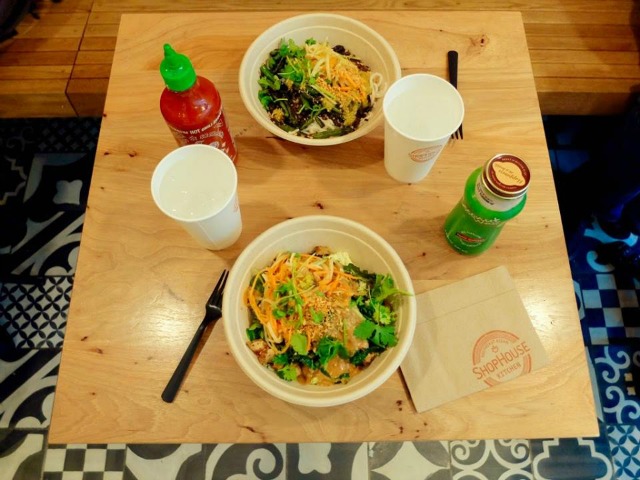How To Dine Out With Food Allergies Without Panicking
By Chicagoist_Guest in Food on Feb 10, 2016 7:00PM

Facebook.com/ShopHouse
By Maureen O'Brien
Family dinner should never have to be a life or death situation. There was a time when you could get together and eat a meal without comment, then get on with passive aggressive digs at your cousin’s boyfriend and watch your aunts start crying because that tramp was never good enough for their brother anyway. Ah, the good old days.
These days, priorities have changed. Now, the focus is on whether Uncle Bill has his gluten-free bread, Aunt Sally has her MSG-free vegetables, Little Jimmy has his nut-free cake and nobody has to go to the emergency room.
Dietary restrictions can be a challenge, to say the least. So here are some tips for eating out with allergies.
Before you leave the house.
First thing’s first; a quick internet search will pull up a series of allergy specific options and reviews. Yelp has 100 pages of dairy free options in Chicago with options for booking tables, specific reviews from dairy free customers, and filtering options. This is available for many different allergies, although the more rare your allergy, the fewer compatriots you will be able to rely on.
The majority of restaurants and chefs are all too happy to work with allergy requirements provided they have enough notice to give you the best dining experience that they can. Chef Chris Pandel (Swift & Sons) says that diners should “call ahead with your reservation and have the host make notes. Confirm all allergies with the service staff. The more info the better.”
So all you need remember is that if you take responsibility for providing the information, people are all too happy to work with you.
These days, servers often ask at the beginning of a meal if anyone has any dietary restrictions. Don't feel bad about speaking up—or, if you feel uncomfortable, pulling the server aside for a private chat.
If you have a particular restaurant in mind, take look at their website first. Chain restaurants usually have a prepared statement about allergies and none of them accommodate every single allergy. However, the majority have an excellent consistency policy, so what it is good in one branch is usually safe in another. If you're looking at a small independent restaurant, what you see on the menu is a pretty good indication of what they have in the kitchen. If nothing looks remotely plausible, be extra-sure to call ahead, or consider another place, since they might not have the resources to come up with a totally new, absolutely delicious dish on the fly.
Don’t be afraid to ask questions
When you arrive at your destination, do not be afraid to look out for your best interests. Ask your server about your specific needs. It usually becomes clear very quickly whether your server a) has sufficient knowledge to answer your question, and b) cares that their food might kill you. If they're indifferent, be very nice but very firm—it's your health on the line.
Ask exact questions. Make absolutely sure there is no gluten in the soy sauce. Check that the pan has never been in contact with peanuts. It can be a little uncomfortable to be demanding at times, but remember that it is important and feel free to ignore anybody who treats you like a diva.
Sadly, there are those who see people (especially young women) asking about specific dietary needs and believe that they are merely dealing with a fussy eater. But most chefs and restaurants will at least plausibly feign that this isn't their position.
Chef Grant Achatz, effectively Chicago restaurant royalty, doesn’t hesitate for a moment that if a diner in his establishment has an allergy there is only one possible answer. “Accommodate them” he says.
And finally…
Trust your instincts. If something smells wrong, tastes wrong, or your gut tells you that something is amiss, send it back or walk away. You and your health are the top priority and you know better than anybody what is wrong. But always be polite, and help dispel the myth that people with food allergies are just picky, entitled eaters.
If you are the friend of someone with an allergy, you are there as an ally; do your own research so your friend doesn’t have to. Walk out with them if need be. Prepare a back up plan just in case.
Allergies can be a challenge, but they don’t have to shut down your social life.